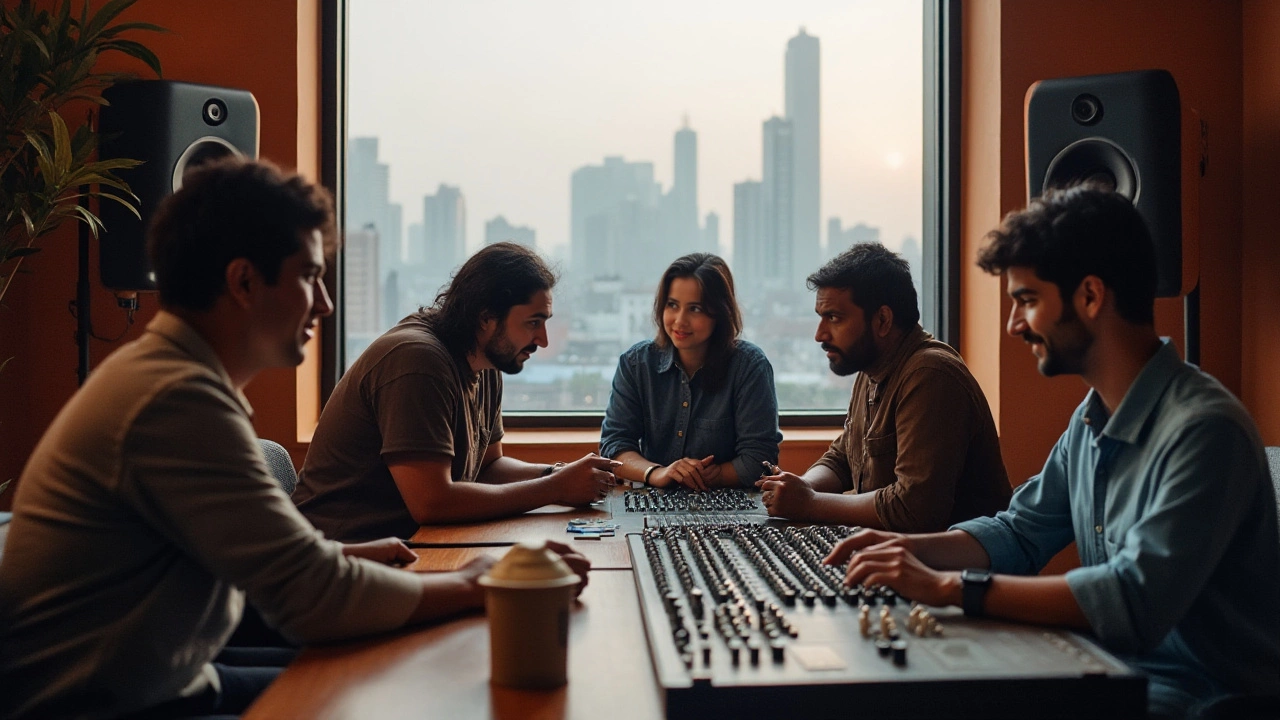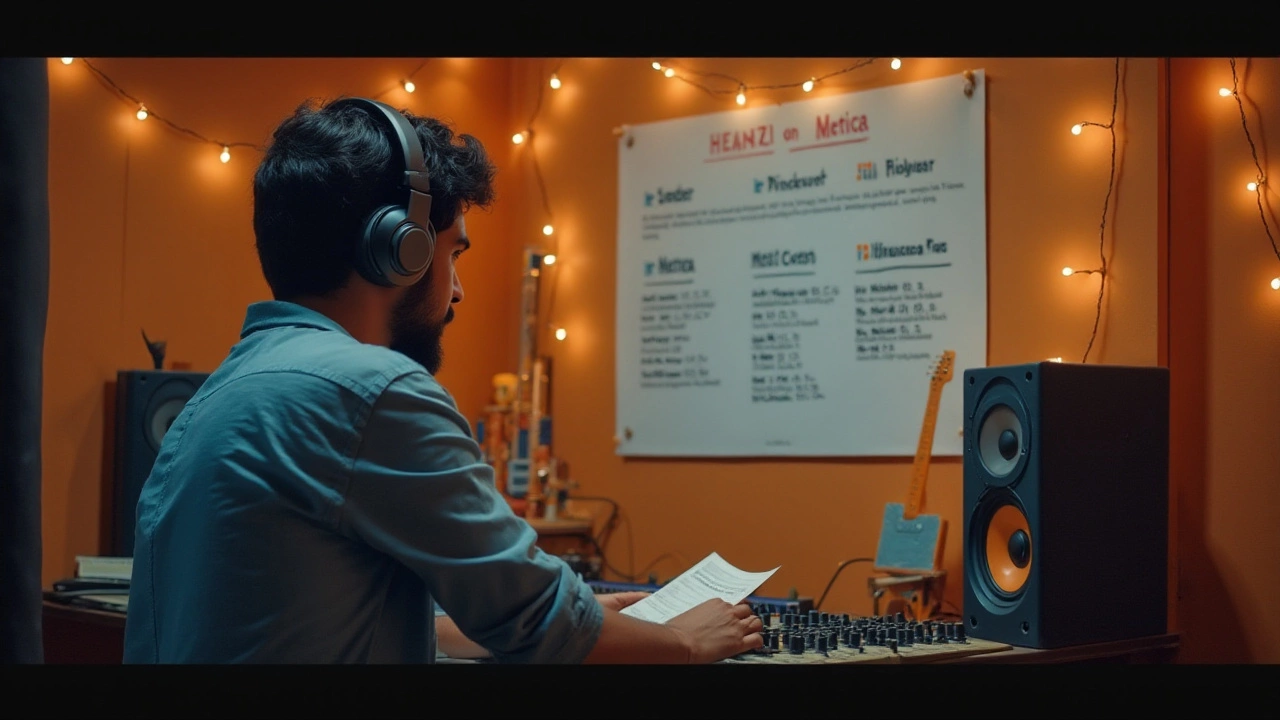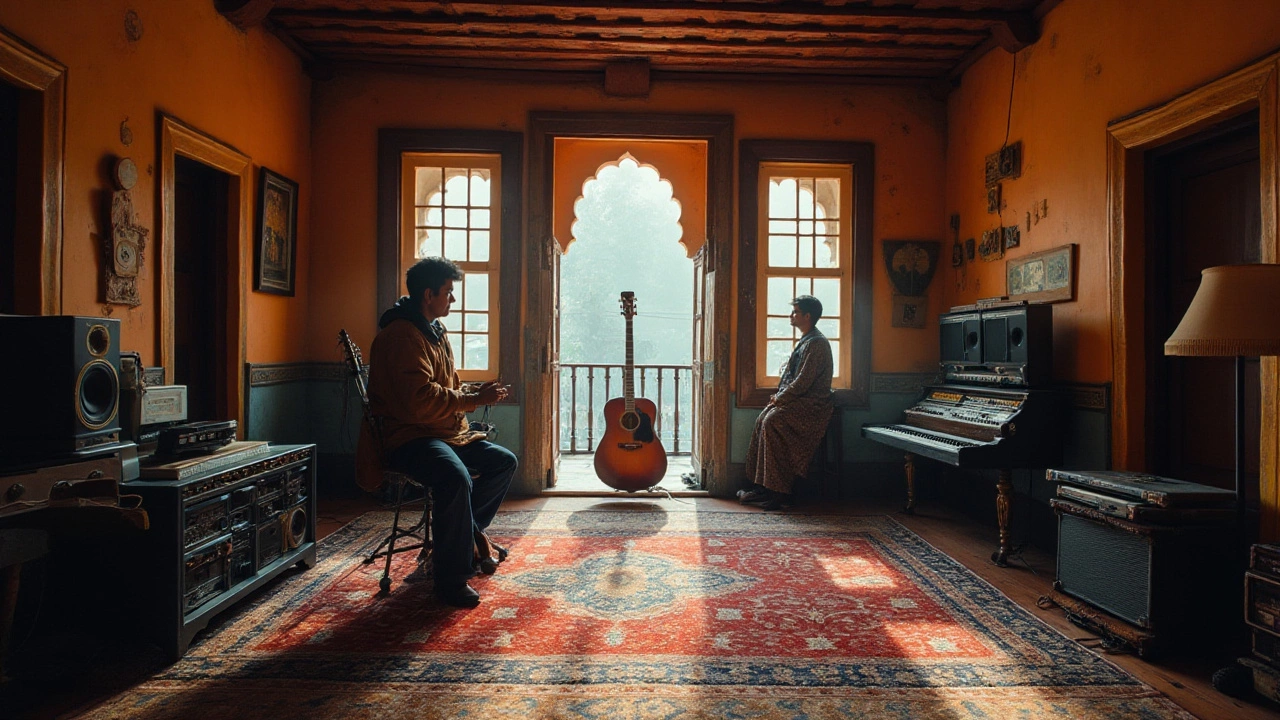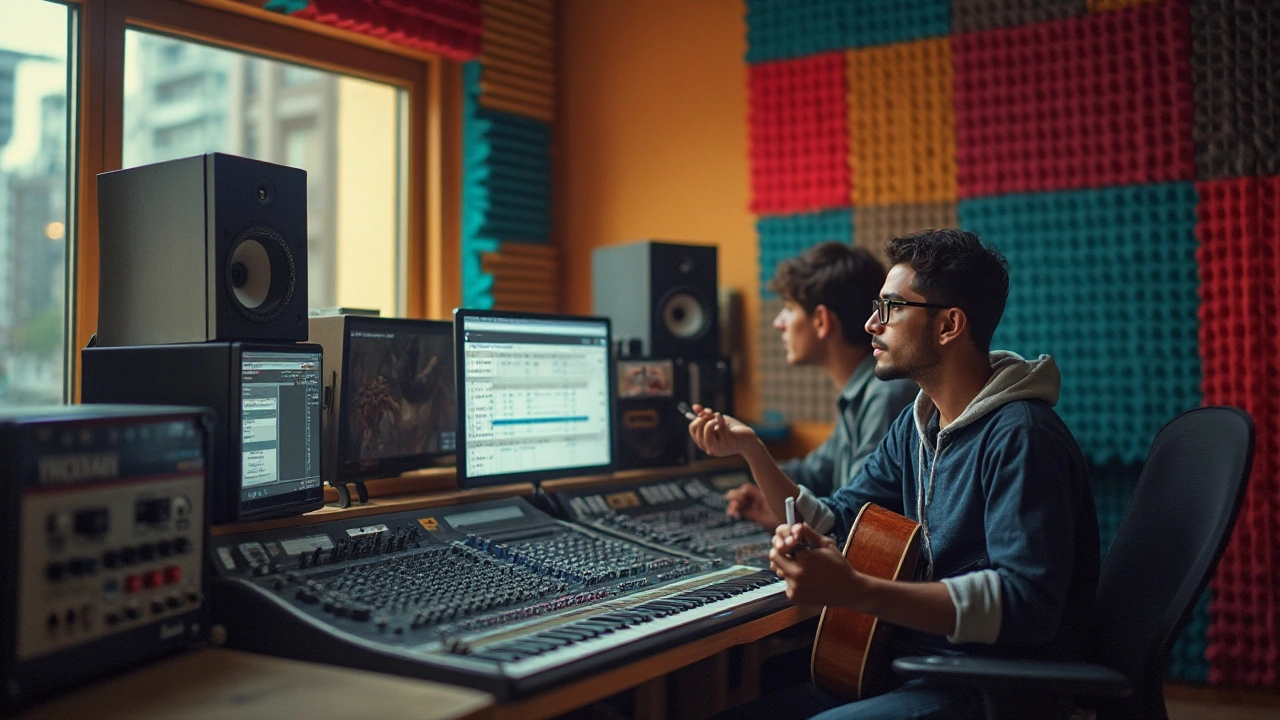Diving into the world of music production is exhilarating, yet it often comes with its own set of challenges, especially when figuring out the costs. Music producers in India are the unseen architects behind chart-topping songs, and they charge diverse fees based on a variety of factors. Understanding these costs can save you both time and resources.
The fees a producer charges can hinge on several aspects such as their level of experience, the type of project, and the studio facilities they offer. Additionally, geographical location plays a significant role. Rates can vary widely from bustling cities like Mumbai to more cost-friendly regions. Knowing the landscape of these charges can help any artist or band make more informed decisions.
- Factors Influencing Producer Fees
- Regional Variations in Pricing
- How to Choose the Right Producer
- Budgeting Tips for Artists
Factors Influencing Producer Fees
Understanding how much music producers in India charge requires peeling back the layers of what influences these fees. At the top of the list is the producer's level of experience. A seasoned producer who has a track record of successful hits will likely command higher fees compared to someone who is just beginning their journey in the music industry. Experience not only brings technical skills and industry contacts but also a reputation that can significantly impact an artist's career trajectory.
The complexity and scale of the project also play crucial roles. Producing a full studio album with intricate arrangements is more labor-intensive than a single track, which reflects in the pricing. Some projects may require collaborations with other artists or session musicians, adding to the production cost. The genre itself can be a determinant; electronic music might necessitate different equipment and time investments compared to acoustically driven rock or classical fusion, each carrying its peculiarities in the studio.
Another significant factor is the facilities and equipment at the studio's disposal. A producer working with cutting-edge technology and state-of-the-art recording studios can offer a sound quality that's hard to match, but this comes with higher production costs. Studios equipped with the latest mixing desks, plug-ins, and acoustics can ensure top-notch production quality, justifying the steeper price. The geographical location of the studio also intertwines with costs, as studios in metropolitan areas like Mumbai might have higher operational expenses than those in smaller cities or towns.
Influence of Genre and Style
Genres significantly impact the choices in a studio setup and the producer's approach, influencing how much time and resources the project will consume. A classical music project could require not only different space but also the expertise of producers familiar with acoustics and arrangements specific to that genre. Conversely, contemporary pop or hip-hop might necessitate digital proficiency and access to samples and beats, which can either reduce or escalate the budget depending on the requirements.
"Pricing is not just about how long a track takes to make, but the legacy it can leave," said renowned music producer and industry veteran, Amit Trivedi, in an interview discussing the nuances of music production economics.
An additional consideration is the producer's unique style or signature sound that aligns with the artist's vision. Artists seeking a particular sound may be willing to invest more to secure the services of a producer known for that specific style, making aesthetics a pivotal factor. Ultimately, aligning with an artist's creative vision is invaluable, making the selection of a producer a crucial investment in the music-making journey.

Regional Variations in Pricing
India's vast and diverse landscape significantly impacts the cost structure for music producers across various cities. Generally, metropolitan hubs like Mumbai, Delhi, and Bengaluru are the epicenters of music production, offering state-of-the-art facilities alongside experienced producers. However, these cities often come with a hefty price tag. For instance, Mumbai, synonymous with Bollywood, often demands premium rates due to high demand and contestation for studio time. Experienced producers here might charge anywhere from INR 50,000 to several lakhs per song. Acclaimed producers with a proven track record or specific expertise can often set their fee even higher, contingent on the project's scale and expectations.
In contrast, cities like Chennai and Kolkata, while equally rich in cultural and musical heritage, often present more affordable options without compromising on quality. These regions have carved their own niches in the classical, indie, and regional music scenes, and producers here might offer their services at relatively lower fees. Aspiring bands or new artists can find experienced producers for less, making these cities attractive for budget-conscious projects.
Meanwhile, exploring smaller towns may reveal hidden gems – talented producers who might not have as much exposure as their metropolitan counterparts but offer unique styles and personalized attention to projects. They can often afford to undercut urban pricing due to lower operational costs and living expenses in these locales. In cities like Pune or Ahmedabad, prices can be strikingly less, starting from as low as INR 10,000 to 20,000 per song, offering a balanced approach for both emerging and established artists looking to stretch their budgets.
An interesting observation shared by Anand Kumar, a renowned sound engineer, encapsulates this trend:
"In India, the megacities are traditionally seen as the go-to places for producing music. However, smaller towns bring a fresh perspective and allow more artistic freedom at feasible prices, fostering a new wave of musical innovation."Additionally, seasonal factors may also influence pricing, with some producers offering discounts or special rates during off-peak times or festivals.
Ultimately, understanding these regional variations in pricing enables artists to strategize accordingly, leveraging both financial constraints and creative aspirations effectively. Whether the allure of big city professionalism or the charm of local flavor, each region in India offers something unique for every musician out there.

How to Choose the Right Producer
Choosing the right music producers can be the pivotal factor in achieving your artistic visions. When embarking on this journey, begin by clearly understanding your musical goals. Are you looking to produce a full-length album or just a few singles? Knowing the scope of your project helps in targeting the right type of producer. Define the musical style you're aiming for, as some producers specialize in specific genres like electronic music, Bollywood-inspired tracks, or indie rock, which might better resonate with your musical identity.
Once you have a clear vision, delve into the research. Scour platforms like Instagram and SoundCloud to find producers whose work aligns with your aspirations. Pay attention to their previous collaborations and the quality of their productions. Personal recommendations from fellow artists or music teachers can also point you towards credible candidates. Engage with potential producers by discussing your project and gauging their passion and understanding of your music. It’s crucial to vibe well with the producer as their enthusiasm can greatly influence the creative process. A strong rapport and mutual respect can be the bedrock of a successful collaboration.
Budget considerations are paramount. While working with the top-tier producers is a dream, new talent and less established producers often bring fresh and innovative ideas at a fraction of the cost. Sometimes, a less famous consultant might align more with your project's vision while being more financially accessible. Remember, budget should not stifle creativity but rather guide efficient choices. Check out their studio setup and ensure the facilities are adequate for your needs; working with top-notch equipment can greatly enhance the sound quality.
"Collaboration with a producer is like a marriage. It requires mutual respect, an understanding of each other's strengths, and dedication to the music." - A. R. RahmanAnother aspect to consider is the producer's workload and availability. Producers with packed schedules might not give your project the attention it deserves. It’s important they can commit time for in-depth studio sessions and post-production work.
It’s wise to look at the contractual terms and agreements a producer proposes. Ensure you understand the business implications, royalty splits, and other legal nuances before signing. This clarity can prevent future disputes and nurture a smooth working relationship. Known for their distinctive style, music producers play a key role in the industry in India. Taking all these steps into account can help you navigate the music landscape and find the right partner to bring your sonic dreams to life.

Budgeting Tips for Artists
Navigating the financial landscape of music production can be daunting, especially for budding artists with limited budgets. Understanding how to allocate funds effectively in the context of India's diverse music industry is crucial. First, research is your best friend. Knowing the typical fees for music producers in your area—whether you're in Mumbai, Delhi, or Chennai—will give you a realistic sense of what to expect and avoid any surprises. Approach this process like a detective; gather as much information as you can from different producers, music forums, and by talking to other artists. Always keep in mind that while some producers might charge a premium due to their extensive experience and prestigious portfolios, there are plenty of talented up-and-coming producers who offer competitive rates.
Setting Clear Budget Priorities
When artists set out to create a budget, it's vital to establish priorities. Begin by listing all potential costs—from studio time and production fees to potential marketing and distribution expenses. Take a close look at your own goals: Is your primary aim to create a single track, an EP, or a full album? Each will have different financial implications. Allocate a portion of your budget specifically for the studio setup, ensuring you have access to quality sound recording equipment and spaces. Remember, cutting corners on essentials might affect the final product's quality. A wise method is to allocate a larger percentage of your budget to elements that directly impact the sound quality, rather than ancillary services that can be incrementally added later.
Exploring Alternative Funding Options
Sometimes, despite all attempts at frugality, financial shortages can occur. Crowdfunding platforms have become increasingly popular among artists as a viable method to bridge these gaps. Websites like Kickstarter and Patreon allow musicians to garner support from their fanbase in exchange for exclusive content, early access to music, or personalized experiences. Additionally, consider seeking sponsorship from local businesses or music venues. Readers might be surprised to learn that many small to medium enterprises are eager to collaborate with artists as part of their marketing strategies, often providing not just funds but also venues for events.
"In 2023, crowdfunding for music projects in India saw a 15% rise, indicating a growing acceptance and trust in this method of financing," states a report by Music Ally.
Negotiation and Building Relationships
Negotiation plays a crucial role in effective budgeting. It's not just about cutting costs; it's about developing mutually beneficial relationships. When approaching a music producer, be transparent about your budget constraints and explore if there are any flexible payment options available. Some producers may agree to staggered payments or reduced rates for artists they believe in. Building a rapport with producers and sound engineers can sometimes open the door to preferential rates or even keen collaborations on future projects. In the music industry, relationships can be as valuable as any invoice or contract. The key is to communicate clearly, set expectations early, and always follow through on commitments.





